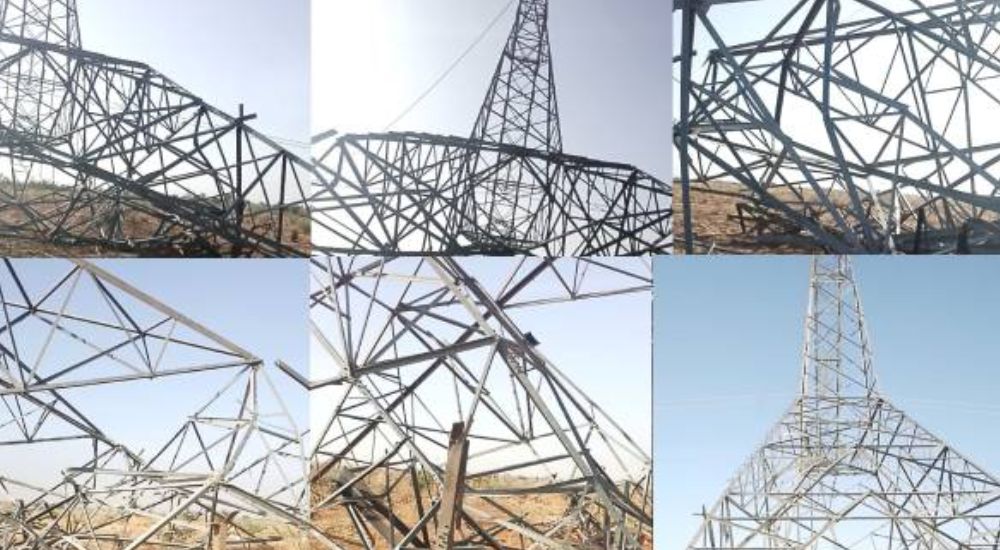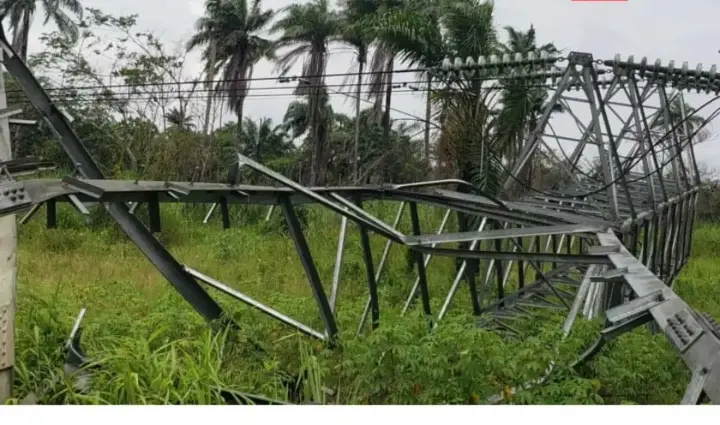The Transmission Company of Nigeria (TCN) has revealed that a staggering N8.8 billion has been expended in 2024 on the repair and restoration of transmission towers destroyed by vandals and bandits. This revelation highlights the significant challenges Nigeria faces in maintaining its power infrastructure amidst widespread vandalism.
Extent of the Damage
At the Quarterly Power Sector Working Group meeting in Abuja, Ahmed Abdulaziz, the Managing Director and CEO of TCN, disclosed that 128 transmission towers across the country were vandalized between January and November 2024. Represented by Engr. Olugbenga Ajiboye, TCN’s Executive Director for Transmission Service Provider, Abdulaziz detailed the enormity of the task of restoring damaged towers and ensuring uninterrupted power supply.
Financial Implications
- Cost of Repairs: Over N8.8 billion has been spent to restore these critical infrastructures.
- Frequent Repairs: The constant need to repair vandalized towers drains financial resources that could have been allocated to power expansion projects.

Challenges in Prosecuting Vandals
Despite efforts to apprehend perpetrators, the TCN laments that most of the arrested individuals gain freedom due to legal loopholes.
Ineffective Charges
According to Abdulaziz:
- Vandals are often charged with theft, which allows them to secure bail.
- If charged under vandalism laws, bail would be impossible, as vandalism is a more severe crime under Nigerian law.
- The police’s categorization of these offenses as theft undermines efforts to deter future incidents.
Recurring Threats
The TCN expressed frustration that vandals often return to sabotage infrastructure after being released on bail, creating a cycle of destruction and repair.
Operational Difficulties in Restoring Power
Abdulaziz further highlighted the operational challenges faced during restoration efforts:
- Insecurity: Many affected areas are unsafe for workers. For instance, when towers in the Shiroro-Mando-Kaduna axis were destroyed, contractors required full military escorts to work on restoration.
- Restricted Access: In some regions, military personnel only permitted contractors to work for limited hours, further delaying repairs.
- Complete Shutdowns: In extreme cases, contractors were prevented from accessing certain areas due to safety concerns.
Impact on Power Delivery
These issues have significantly hindered TCN’s ability to deliver reliable electricity to Nigerians, exacerbating the country’s persistent power challenges.
SEE ALSO: Major Investments from Rockefeller Foundation and Bezos Earth Fund to Boost Nigeria’s Power Sector
Broader Implications for Nigeria’s Power Sector
The recurring vandalism and the associated financial and operational burdens reflect deeper systemic issues within Nigeria’s power infrastructure.
1. Economic Impact
- The diversion of N8.8 billion to repair vandalized towers reduces funding for critical projects such as grid expansion and modernization.
- Frequent outages resulting from damaged towers disrupt industries and businesses, impacting economic growth.
2. Security Concerns
- The need for military escorts in some areas underscores the intersection of infrastructure challenges and Nigeria’s broader insecurity problems.
- Unsecured power lines and towers in volatile regions remain easy targets for vandals and bandits.
3. Legal and Policy Shortcomings
- The absence of stringent legal frameworks for addressing vandalism perpetuates the problem.
- The failure to prosecute offenders effectively sends a message of impunity, emboldening others to engage in similar acts.
SEE ALSO: Nigeria’s National Grid Collapses Again, Worsening Struggles for Startups and Businesses
The Way Forward
To address the challenges of vandalism and ensure sustainable power delivery, a multi-pronged approach is necessary:
1. Strengthen Legal Frameworks
- Reclassification of Offenses: Vandals should be charged under vandalism laws, with stricter penalties to deter such acts.
- Judicial Reforms: Expedite cases involving vandalism to ensure swift justice and prevent reoccurrences.
2. Enhance Security Measures
- Deploy advanced surveillance systems, such as drones and motion sensors, to monitor transmission towers.
- Collaborate with local communities to act as custodians of nearby infrastructure, providing them with incentives.
3. Increase Public Awareness
- Educate communities on the consequences of vandalism, including its economic and social impacts.
- Foster partnerships with civil society organizations to promote civic responsibility.
4. Boost Operational Resilience
- Equip contractors with enhanced security support to ensure uninterrupted restoration efforts.
- Invest in infrastructure hardening to make towers more resistant to sabotage.
Conclusion
The destruction of 128 transmission towers in 2024 alone paints a grim picture of the vulnerabilities in Nigeria’s power sector. The N8.8 billion spent on repairs underscores the high cost of these acts of sabotage. To secure the country’s energy future, a concerted effort involving stronger laws, improved security, and heightened public awareness is critical. Only through such measures can Nigeria’s power sector break free from this cycle of destruction and pave the way for reliable electricity delivery to all citizens.




